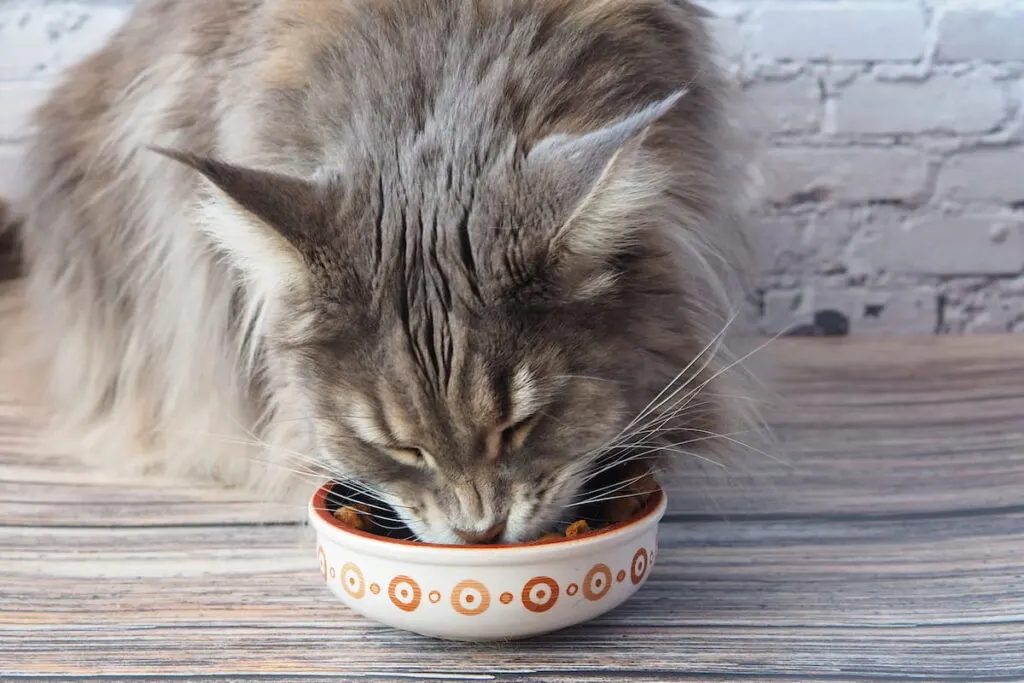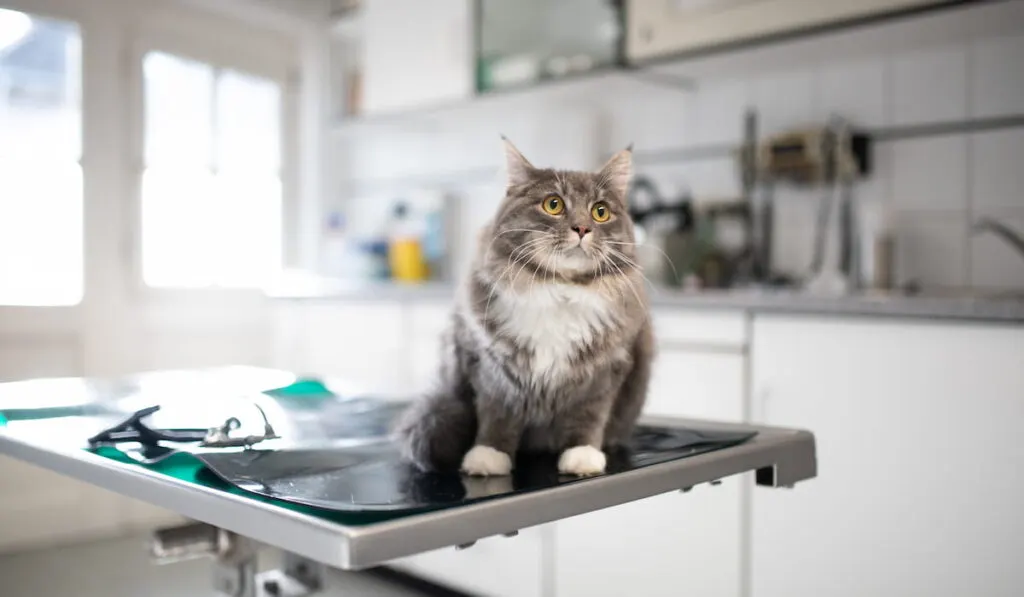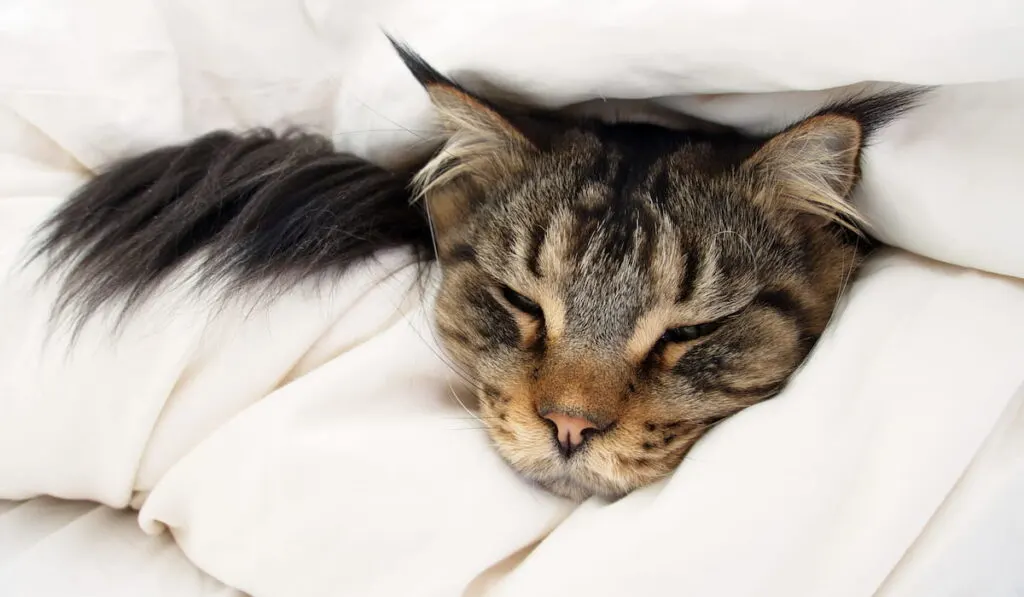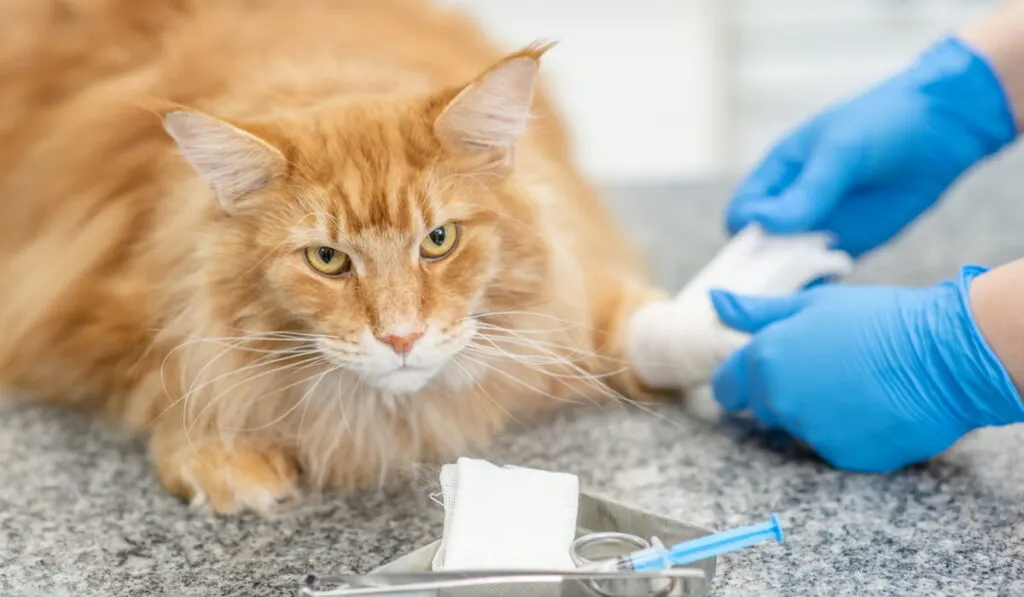Cats probably wonder where the remaining eight lives we claim they have come from. The obvious truth is cats have one life, but the lifespan of the different breeds differs.
Maine Coon Cats are one of the most lovable domestic cat breeds.
They are typically large, healthy, charming, and quite popular. Of course, if you have a Maine Coon, you will want to keep it healthy, and in the same vein, you may want to know how long it may live.
How long do Maine Coon cats live? The average lifespan of Maine Coons is not far off the average for most cats.
Most Maine Coon cats will live for around 10 to 13 years. But some outliers live for up to 15-16 years.

On the whole, how long a Maine Coon cat will live depends on several factors including diet, health care, emotional care, and exercise.
You may have other questions regarding the life expectancy of your Maine Coon cat.
Read the rest of this post to know more about how long Maine Coon cats live.
Table of Contents
Factors Affecting the Lifespan of Maine Coon Cats
The following factors influence the health of Maine Coon cats, and consequently, affects how long they live:
Exercise
No pun intended, but obesity is big amongst Maine Coons.
If you feed your cat excessively without exposing them to sufficient exercise, they will become obese.
Alas! Letting your cat stay obese – even though it makes them fluffier and cuter – puts them at risk of more diseases.
Increased exposure to diseases, of course, will hamper the cat’s health and lifespan.
It is important to expose your cat to more exercise.
Offer your Maine Coon more toys, play with them, and take them for walks when possible.
The most important thing is to ensure they get enough exercise to stay healthy. By doing this, you increase their chances of living longer.
Diet
Diet is important too. Remember the saying, “you are what you eat.” Your Maine Coons are what they eat.
So, if they do not get a proper diet, they will not live properly. But if you feed them appropriately, they will enjoy health for longer.

For a Maine Coon cat, the appropriate diet is high-protein, low-carb, low-fat, and dry.
Giving your cat dry food reduces the accumulation of tartar in their teeth. Their feed being low-carb and low-fat means they will consume fewer calories.
This, in turn, reduces their chances of growing excessively fat.
Health Care
Access to quality healthcare also plays a part in the lifespan of your Maine Coon.
Regular checkups at a vet clinic might be effective in detecting and treating serious illnesses before they exacerbate. These visits will also help prevent some diseases.
Additionally, emotional care – offering your cat loads of love will keep them happy. If your cat is happy, their quality of life higher causing them to live longer.
What Health Issues Do Maine Coon Cats Have?
Generally, Maine Coons are thought to be healthy and hardy. However, they are prone to some health issues, including the following:
Spinal Muscular Atrophy
Spinal Muscular Atrophy in Maine Coons is a disease that affects the muscle and nerves of the spine.
It typically occurs early in the life of the cats. Spinal muscular atrophy leads to muscle weakness and reduced neuronal function.
This genetic disease can kill the cat quickly if not treated early enough.
Some symptoms of this disease include an odd gait, muscle weakness, inability to jump, and inability to stand without some form of assistance.

Stomatitis
Stomatitis causes inflammation of the mouth and gums of Maine Coon cats.
The inflammation is usually very painful and may even cause a loss of appetite in affected cats.
Stomatitis may be genetic and may also be a complication of certain viral diseases in your cat.
An affected cat will have gums that bleed easily. Its breath may also smell while it drools excessively.
Obesity
Obesity is one disease that may be avoided with a proper diet. It is a disease marked by excessive body mass.
A Maine Coon cat may be obese if it has a thick layer of fat covering its ribs.
Another sign of possible obesity in Maine Coons is the absence of a concave narrowing at the waist region.
Also, your cat may be obese if its backbone, hip bone, and shoulder blade are covered by fat. The listed bones should be clearly defined under normal conditions.
Hypertrophic Cardiomyopathy
Hypertrophic Cardiomyopathy is a disease of the heart, which appears to have strong hereditary links.
This disease is marked by the inability of the heart to pump blood efficiently and is caused by abnormal thickening of the heart muscles.
Feline Hypertrophic Cardiomyopathy may manifest in Maine Coons once they reach 6 months or older.
In some cases, there may be no symptoms. But when there are symptoms, you may notice the following:

- Sluggishness
- Reduced appetite
- Rapid shallow breathing
- Frequent fainting spells
- Persistent cough
- Paralysis of the hind limbs
Polycystic Kidney Disease
As evident in the name, Polycystic Kidney Disease affects the renal function of Maine Coons.
It is an irreversible genetic disease that is usually already present at birth.
Polycystic kidney disease is marked by the development of outgrowths and ulcers on one or both kidneys.
The silver lining of this disease is that it progresses slowly. So, symptoms may not even show until the cat is around 7 years old.
Some symptoms of polycystic kidney disease in Maine Coons are increased thirst and frequent urination.
A symptomatic cat may also experience weight loss, sluggishness, increased regurgitation, and reduced appetite.
Periodontal Disease
Periodontal disease affects the gums of Maine Coon cats.
It is pretty common amongst cats and is sometimes called Gum Disease.
Hip Dysplasia
Hip dysplasia is another disease that can start early in the life of Maine Coons – from 2 years and above.
It is marked by deformities that leave the hip bones at increased risk of dislocation.
The symptoms of hip dysplasia may be worsened by your Maine Coon being overweight. Hence, another reason you should ensure it does not become obese.
The best approach to treating hip dysplasia appears to be surgery.
The deformation is corrected, and the hip bones are fitted correctly.
In some cases, the veterinarian may also prescribe medications to ease the symptoms and promote healing from the injuries caused by the disease.

How Old Was the Oldest Maine Coon Cat?
It turns out that there are varying reports on the oldest Maine Coon cat.
However, most sources recognize Rubble as the Maine Coon that has lived the longest.
Rubble was a fluffy Maine Coon that lived for 31 years, according to its owner.
Males vs Females
There is no marked disparity in the life expectancy of male Maine Coons and female Maine Coons.
As long as either gender is neutered, they should live a healthy life, barring other health issues.
That aside, male Maine Coons are bigger than females. They are also more socially demanding and are more playful than the females.
Female Maine Coons are also social, friendly, and affable. But not to the extent of the males. They are relatively more laid back and a bit more careful in their social interactions.
All in all, the differences between them are not overly significant. Whichever you opt for, both males and females make excellent pets.
Summary
In the absence of any deadly illness, a Maine Coon cat can live for around 10-13 years.
In some cases, Maine Coon cats may stay around until they are 15 years old.
In even rarer cases, they may live into the 20s, and if anyone else gets lucky like Rubble’s owner, they may live into their 30s.
Resources
- http://www.mainecoonguide.com/what-is-the-average-maine-coon-lifespan/
- https://mainecoon.org/what-is-the-average-life-span-of-a-maine-coon/
- https://mainecoon.org/maine-coon-cats-life-expectancy-keep-happy-healthy-longer/
- https://mainecooncentral.com/maine-coon-health-issues/
- https://mainecoonadmirer.com/adopt-a-proper-diet-for-your-cat/
- https://www.wellpets.com/blog/62-stomatitis-in-cats-diagnosing-and-treating-this-feline-dental-disease
- https://www.dailymail.co.uk/news/article-8487019/The-devasted-owner-reveals-Rubble-worlds-oldest-cat-died-age-31.html
- https://www.itv.com/news/westcountry/2020-07-03/worlds-oldest-cat-who-lived-in-exeter-dies-at-the-age-of-31
- https://www.foxnews.com/lifestyle/worlds-oldest-cat-celebrates-30th-birthday
- https://mainecoon.org/male-vs-female-maine-coons/
